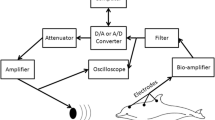Abstract
The effects of adapting sounds (pip trains or pure tones) on auditory evoked potentials (the rate following response, RFR) were investigated in a beluga whale. During RFR acquisition, adapting signals lasting 128 ms each were alternated with test signals lasting 16 ms each; the test signal levels varied randomly. Adapting signals were trains of cosine-enveloped tone pips or pure tones. Pip rate varied with the envelope cosine cycle maintained at 0.125 of pip intervals and the cosine rise–fall time maintained at 0.0625 of pip intervals. Adapting signals shifted the amplitude-level function upward compared to the baseline (no adapting signal) function. The higher the adapting signal level was, the bigger the shift in the amplitude-level function was. The slower the pips were in the adapting signal, the smaller the adaptation effect was. A train of pips with a 0.0625-ms rise–fall time and 125 dB SPL shifted the function by 35–40 dB, whereas a train of pips with a 1-ms rise–fall time or a pure tone with the same SPL shifted the function by approximately 15 dB. The difference between the “fast” and “slow” adapting signals is supposed to be associated with their abilities to stimulate the auditory system in odontocetes.






Similar content being viewed by others
Abbreviations
- ABR:
-
Auditory brainstem response
- AEP:
-
Auditory evoked potential
- RFR:
-
Rate following response
- RMS:
-
Root-mean-square
- SPL:
-
Sound pressure level
- TTS:
-
Temporary threshold shift
References
Au WWL (1993) The sonar of dolphins. Springer, New York
Au WWL, Hastings MC (2008) Principles of marine bioacoustics. Springer-Science, New York
Chimento TS, Schreiner CE (1991) Adaptation and recovery from adaptation in single fiber responses of the cat auditory nerve. J Acoust Soc Am 90:263–279
Dean I, Harper NS, McAlpine D (2005) Neural population coding of sound level adapts to stimulus statistics. Nat Neurosci 8:1684–1689. https://doi.org/10.1038/nn1541
Dean I, Robinson BL, Harper NS, McAlpine D (2008) Rapid neural adaptation to sound level statistics. J Neurosci 28:6430–6438. https://doi.org/10.1523/JNEUROSCI.0470-08.2008
Eggermont JJ (1985) Peripheral auditory adaptation and fatigue: a model oriented review. Hear Res 18:57–71. https://doi.org/10.1016/0378-5955(85)90110-8
Eggermont JJ, Spoor A (1973) Cochlear adaptation in quinea pigs. A quantitative description. Audiology 12:221–241
Finneran JJ (2015) Noise-induced hearing loss in marine mammals: a review of temporary threshold shift studies from 1996 to 2015. J Acoust Soc Am 138:1702–1726. https://doi.org/10.1121/1.4927418
Hewitt MJ, Meddis R (1991) An evaluation of eight computer models of mammalian inner hair cell function. J Acoust Soc Am 90:904–917. https://doi.org/10.1121/1.401957
Kiang NYS, Watanabe T, Thomas EC, Clark LF (1965) Discharge patterns of single fibers in the cat’s auditory nerve. MIT Press, Cambridge
Klishin VO, Popov VV, Supin YA (2000) Hearing capabilities of a beluga whale, Delphinapterus leucas. Aquat Mamm 26:212–228
Meddis R (1988) Simulation of auditory-neural transduction: further studies. J Acoust Soc Am 83:1056–1063. https://doi.org/10.1121/1.396050
Popov VV, Supin AY (2001) Contribution of various frequency bands to ABR in dolphins. Hear Res 151:250–260. https://doi.org/10.1016/S0378-5955(00)00234-3
Popov VV, Supin AY (2009) Comparison of directional selectivity of hearing in a beluga whale and a bottlenose dolphin. J Acoust Soc Am 126:1581–1587. https://doi.org/10.1121/1.3177273
Popov VV, Supin AY, Rozhnov VV, Nechaev DI, Sysuyeva EV, Klishin VO, Pletenko MG, Tarakanov MB (2013) Hearing threshold shifts and recovery after noise exposure in beluga whales, Delphinapterus leucas. J Exp Biol 216:1587–1596. https://doi.org/10.1242/jeb.078345
Popov VV, Sysueva EV, Nechaev DI, Rozhnov VV, Supin AY (2016) Auditory evoked potentials in the auditory system of a beluga whale Delphinapterus leucas to prolonged sound stimuli. J Acoust Soc Am 139:1101–1109. https://doi.org/10.1121/1.4943554
Popov VV, Nechaev DI, Supin AY, Sysueva EV (2018) Adaptation processes in the auditory system of a beluga whale Delphinapterus leucas. Plos One 13:e0201121. https://doi.org/10.1371/journal.pone.0201121
Smith RL (1977) Short term adaptation in single auditory nerve fibers: some poststimulatory effect. J Neurophysiol 40:1098–1112
Smith RL (1979) Adaptation, saturation, and physiological masking in single auditory-nerve fibers. J Acoust Soc Am 65:166–178
Smith RL, Zwislocki JJ (1975) Short-term adaptation and incremental responses of single auditory-nerve fibers. Biol Cybernetics 17:169–182
Supin AY, Popov VV (1995) Envelope-following response and modulation transfer function in the dolphin’s auditory system. Hear Res 92:38–46. https://doi.org/10.1016/0378-5955(95)00194-8
Supin AY, Popov VV (2007) Improved techniques of evoked potential audiometry in odontocetes. Aquat Mamm 33:17–26
Supin AY, Popov VV, Mass AM (2001) The Sensory physiology of aquatic mammals. Kluwer, New York
Viemeister NF (1988) Intensity coding and the dynamic-range problem. Hear Res 34:267–274. https://doi.org/10.1016/0378-5955(88)90007-X
Watkins PV, Barbour DL (2008) Specialized neuronal adaptation for preserving input sensitivity. Nat Neurosci 11:1259–1261. https://doi.org/10.1038/nn.2201
Wen B, Wang GI, Dean I, Delgutte B (2009) Dynamic range adaptation to sound level statistics in the auditory nerve. J Neurosci 29:13797–13808. https://doi.org/10.1523/JNEUROSCI.5610-08.2009
Wen B, Wang GI, Dean I, Delgutte B (2012) Time course of dynamic range adaptation in the auditory nerve. J Neurophysiol 108:69–82. https://doi.org/10.1152/jn.00055.2012
Westerman LA, Smith RL (1984) Rapid and short-term adaptation in auditory nerve response. Hear Res 15:249–260
Zilany MSA, Carney LH (2010) Power-law dynamics in an auditory-nerve model can account for neural adaptation to sound-level statistics. J Neurosci 30:10380–10390. https://doi.org/10.1523/JNEUROSCI.0647-10.2010
Acknowledgements
This study was supported by the Russian Foundation for Basic Research (Grant no. 18-04-00088) to VVP. All procedures performed in the study were in accordance with the ethical standards of the Institute of Ecology and Evolution, Russian Academy of Sciences, and were approved by the Ethical Committee of the Institute. Authors thank American Journal experts for language editing.
Funding
This study was supported by the Russian Foundation for Basic Research (Grant no. 18-04-00088).
Author information
Authors and Affiliations
Corresponding author
Ethics declarations
Conflict of interest
The authors declare that they have no conflict of interest.
Additional information
Publisher's Note
Springer Nature remains neutral with regard to jurisdictional claims in published maps and institutional affiliations.
Rights and permissions
About this article
Cite this article
Popov, V.V., Supin, A.Y., Nechaev, D.I. et al. Adaptation in the auditory system of a beluga whale: effect of adapting sound parameters. J Comp Physiol A 205, 707–715 (2019). https://doi.org/10.1007/s00359-019-01358-w
Received:
Revised:
Accepted:
Published:
Issue Date:
DOI: https://doi.org/10.1007/s00359-019-01358-w




